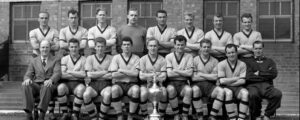We don’t often pay much attention to the assigned team names of clubs when they’re in the news, in the scoreboards and – of course – the league table, not realising in many cases what historical background lies behind them. We especially don’t necessarily think about the changes that have happened to football team names throughout history and what has influenced their formation. However, many consider identity to be of the utmost importance and, despite this, it is something that is most usually overshadowed in the modern age. Although, we won’t be going into too much detail at this moment in time

“Seventy per cent of success depends on identity.”
– words spoken by the Portuguese Joao Janeiro. At the time of interview, he was the then head coach of Kisvárda.
In every country in the heroic era, there were associations that operated without their own facilities for a long time, and had no choice but to rent out different pitches in order to hold their own home-hosted matches, essentially meaning that they played continuously as guests during their own games. In England, those clubs are usually associated as being Rovers, Rangers or Wanderers, and very rarely with the ‘nomads’ suffix.
Football Team Names Throughout History
Among the more well-known football clubs – Queens Park Rangers, for example – legend has it that they visited 20 sublets before finally settling at Loftus Road. On the other hand, Bolton Wanderers were “rugby-bound” with the three pitches they had tried in their first four years whilst agreeing on a deal at Burnden Park. England’s second-longest-running football club, Wolverhampton Wanderers, owes its name to the cricket club, Blakenhall wanderers. Blackburn Rovers played their first game in 1875, but it wasn’t until 1893, after five FA Cup victories, that they finally took possession of the site that remains home to them, Ewood Park, which was described at the time as “little more than an empty piece of land”.

These were among the dominant clubs at the time; in 1888, when the English professional football league, the Football League, was founded, three of the four (Blackburn, Bolton and Wolverhampton) were among the 12 founders.
The Wolves are currently in the top flight, QPR and Blackburn are second in the league and Bolton are in the third tier.
Let us not forget the Wanderers FC, nicknamed Rovers, which was a factor in English football even earlier than the heroic era, in fact in the “prehistoric era”. Founded in Leytonstone, east London in 1859, the club took the name Wanderers five years later, winning the first FA Cup in 1872 and ending it in 1887. (In 2009, it was re-founded by enthusiastic amateurs to play football in the 13th division of the English league system.)
For gourmets, we recommend seeing the club’s black-orange-pink striped shirt used in the cross between 1872 and 1878; although this is only a graphic and photograph made according to contemporary reports, no pictures of this installation have survived. Also, a special club would be the previously presented Green Forest Rovers, which has put sustainable development at the heart of its operation.
The Exceptions
One of the world’s best-known “wandering clubs”, Glasgow Rangers FC, was not christened in this way, but legend has it that one of the four founders chose the name after reading an *almanack and liked the name of the Swindon Rangers rugby team (or the snow-white jersey adorned with a blue cross on the chest).
*(a handbook, typically published annually, containing information of general interest or on a sport or pastime) – American spelling: Almanac
Source; Here
The New York Rangers, one of the NHL’s six founders, are lovingly known as Wanderers also, but the naming had nothing to do with any actual wandering. On the contrary, the home-ground was given to the founding association and the team was then formed after that in this case. This happened because of a wealthy businessman, Tex Rickard, the same person who had built Madison Square Garden; Among many others, Madison Square Garden had served as the home of the New York American’s hockey team.
Rickard, who was born January 2, 1870 and started out as a boxing promoter, envied the success of the New York American’s hockey team, and in 1926 he then formed a hockey team of his own. At the time it was then called Tex’s Rangers by the media – a reference to the Texas Rangers, the famous police organisation of the time – and, since many liked the funny name, it stuck.
Note: The Texas Rangers are well known for their role in the Chuck Norris series ‘Walker, Texas Ranger’, and they are not to be confused with the baseball club of the same name.
Of course, we can find football teams who also have this name, not only in the island country but also in areas where English influence was strong in the heroic era. For example,: Chile has the Santiago Wanderers and Rangers de Talca; Uruguay has the Montevideo Wanderers and Malta has the Sliema Wanderers. Australia and New Zealand also abound in bands with these first names, and some “wanderers” can be found in Africa and Asia. In Lesotho, for example, there are the Roma Rovers or Nyenye Rovers, and in the Philippines, the Manila Nomads, who became the country’s first championship team in 1914.
Argentina also had a prominent island influence, when a club called Excursionistas commemorates, at a time when a football team existed without a pitch of its own; In Brazil, in Sao Paulo, Scottish Wanderers FC operated – although not for long, only lasting from 1913 to 1916.
In Hungary, Óbuda 33 FC was perhaps the most well-known migratory team. In addition, the Buda association, founded in 1900 as 33 Football Clubja, didn’t just have a home-ground, but also had a permanent name. A wikipedia article written on the topic, states the following:
“In the professional league introduced from the 1926-27 season, the club started a team called Budai 33 FC, but within a short time a dispute broke out between the leaders of the amateur sports club and the professional football team about the use of the name. Due to a court decision, the professional team could no longer use the name Budai 33, so from 1929 they continued to play under the name Budai 11, regardless of the club that still operates an amateur team under the name of “33” FC”.
In 1938, the club, which also had many players in the national team, said goodbye to the top flight forever, and then ceased to exist in 1958. It was then re-established in 2011 and has been in lower BLSZ classes ever since.

If we were to browse the Hungarian newspapers of the 1920s on Arcanum, we can see that kisok and BSZKRT were in similar shoes at the time, although the latter (today known as BKV Forward) “built its modern and beautiful track next to the Hungária Road track” by 1929.
By the way, the migration of teams is still present today at lower levels, in the amateur classes, whether we look around at home or abroad, since the hinterland of football is usually more extensive than the number of facilities available. Among the reasons for this is the sad tendency – at least in Hungary – that since the change of regime, in some places, many tracks have disappeared. This is especially true in the country’s capital, Budapest.
Let’s not get too far of topic and return to England, at the same we will broaden our horizons a little. There are several suffixes, besides those mentioned above, that have an interesting origin.
In foggy Albion, the Albion suffix might refer to anything other than the island nation itself, that is, the white rocks representing its contour in several places, first of all at Dover; The Athletic extension commemorates where the football club was formed from a gathering of athletes (it is a particularly exciting topic that a club with this name has never won a champion in the top division).
The founders of Sheffield Wednesday had no easy task, as the city’s other football team had already hitchhiked the name United (usually a sign of the merger of several smaller clubs) and resorted to a simple solution: they put their name on the day on which the cricket team on which the football club was based played its matches. If you think about it, the addition of former BEK winner Nottingham Forest, who saw better days, evokes Robin Hood and his home country, Sherwood Forest.
The, oftenly occurring, City and Town suffixes are pretty clear, but what does the suffix Argyle, Palace or Harriers mean? Perhaps this is the perfect topic for us to create a follow-up article in this topic



